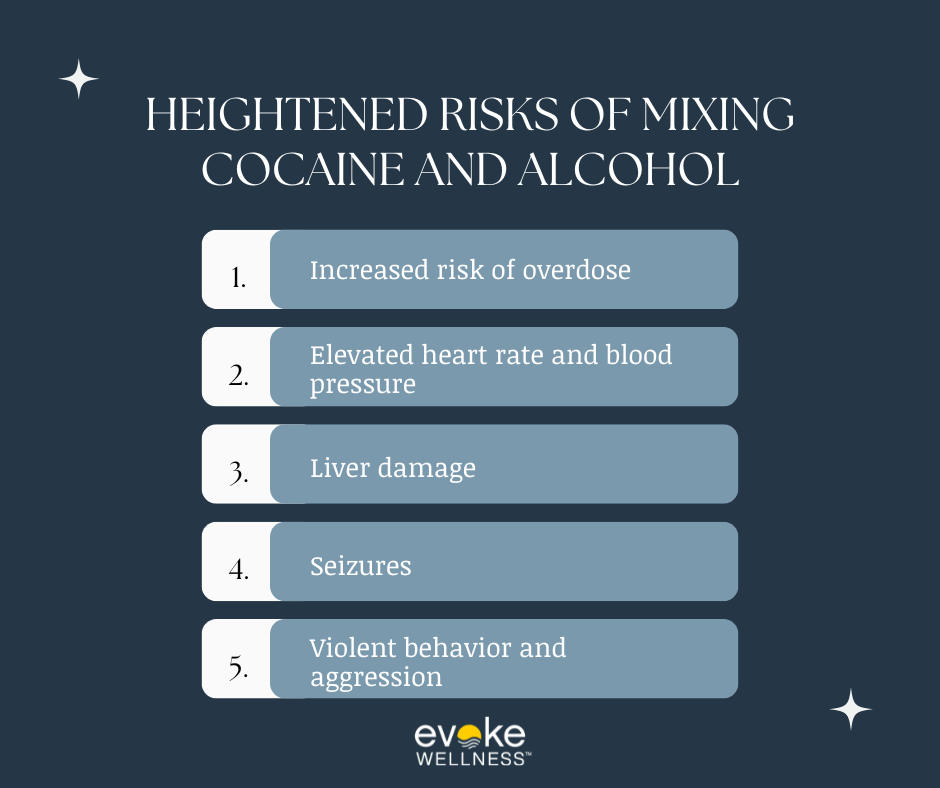You may think combining cocaine and alcohol creates a heightened euphoria, but this dangerous mix can have devastating consequences. According to the National Institute on Drug Abuse, over 5 million Americans reported using cocaine in 2020, with many also abusing alcohol. This lethal combination significantly increases your risk of overdose and long-term health issues. At Evoke Wellness at Coconut Creek, we understand the complexities of dual addictions and offer specialized treatment programs to address both cocaine and alcohol dependency. Our evidence-based approach provides you with the tools and support needed to break free from the cycle of addiction and reclaim your life.
If you or a loved one is struggling, help is available today. Call (833) 969-3318 to speak with our compassionate team, or reach out online and schedule an appointment to begin a healing journey.
Cocaine and Alcohol Abuse | The Dangers of Mixing Cocaine and Alcohol
Combining cocaine and alcohol is an extremely hazardous practice that can lead to life-threatening consequences. According to the National Institute on Drug Abuse, over 5,000 people die each year from overdoses involving this deadly mixture.
Heightened Toxicity
Cocaine and alcohol are both central nervous system stimulants, but they have opposing effects. When consumed together, they form a toxic compound called cocaethylene, which intensifies the euphoric effects of cocaine while prolonging its stimulant properties. This “speedball” effect significantly increases the risk of overdose, heart problems, and other severe health issues.
Masking Effects
Alcohol can mask the effects of cocaine, causing users to consume more of both substances in a vicious cycle. As stated by Evoke Wellness at Coconut Creek, this combination can lead to higher blood alcohol levels due to cocaine’s ability to increase alcohol metabolism, further compounding the risk of overdose.
Long-Term Consequences
Beyond the immediate dangers, mixing cocaine and alcohol can have long-lasting cognitive and psychological impacts. Research has shown that this combination can lead to aggressive or violent behavior, as well as an increased risk of developing mental health disorders like anxiety, depression, and psychosis.
Comprehensive addiction treatment programs that address both cocaine and alcohol abuse, such as those offered at Evoke Wellness, are crucial for individuals struggling with this type of polysubstance abuse. These programs typically include a combination of medical detox, behavioral therapies, and ongoing support to help individuals achieve and maintain sobriety.
Why Do People Mix Cocaine and Alcohol? | Why Do People Use Cocaine When Drinking Alcohol?
The Dangerous Combination
People often combine cocaine and alcohol due to the stimulant effects of cocaine counteracting the depressant effects of alcohol. This allows users to drink more without feeling as intoxicated. However, this practice is extremely risky and can lead to dire consequences.
Increased Health Risks
Mixing these substances puts immense strain on the cardiovascular system and significantly increases the risk of:
- Heart problems
- Overdose
- Death
It also impairs judgment, leading to risky behaviors like driving under the influence.
Masking Effects
Cocaine masks alcohol’s sedative effects, causing people to consume dangerously high amounts that can result in alcohol poisoning. This combination also exacerbates underlying mental health issues like anxiety or depression, as individuals may use it as a way to self-medicate.
The Bottom Line
Using cocaine and alcohol together should be avoided entirely. If you or someone you know is struggling with substance abuse, seeking professional help through detox programs, counseling, and support groups is crucial to address the root causes and develop healthy coping mechanisms.
Effects of Combining Cocaine and Alcohol | What Happens When You Mix Cocaine and Alcohol?
Combining cocaine and alcohol creates a dangerous compound called cocaethylene in the body. This toxic byproduct intensifies the euphoric effects of both substances while increasing the risk of sudden death. According to the National Institute on Drug Abuse, cocaethylene is formed faster than the body can eliminate it, causing higher toxicity levels.
Increased Heart Risks
- Cocaethylene increases the risk of irregular heart rhythm disturbances and cardiovascular complications.
- It can cause dangerously high blood pressure spikes, risking heart attacks or strokes.
Liver Damage
- The liver has to work overtime to metabolize cocaethylene, potentially causing severe liver injury or failure over time.
- Alcohol and cocaine are both hepatotoxic, compounding liver damage when combined.
Heightened Impulsivity
- The mixture intensifies cocaine’s euphoric high while reducing alcohol’s sedative effects.
- This can lead to increased aggression, violence, and impulsive risk-taking behaviors.
Mental Health Impact
- Cocaethylene may trigger paranoia, psychosis, anxiety, and depression more severely than using either substance alone.
- It can worsen symptoms of mental health disorders like bipolar disorder.
The hazardous effects highlight why using cocaine and alcohol together should be avoided entirely. Seeking comprehensive addiction treatment is crucial for overcoming polysubstance abuse safely.
Health Risks of Mixing Cocaine and Alcohol | The Dangers of Mixing Alcohol and Cocaine
Potent Combination
Mixing cocaine and alcohol is an incredibly dangerous combination that can have severe consequences. When these two substances are used together, they create a toxic byproduct called cocaethylene in the body. According to studies, cocaethylene intensifies the euphoric effects of cocaine while also increasing the risk of sudden death.
Heightened Risks
This combination also heightens the addictive properties of both substances, making it harder to quit.
Deadly Statistics
A study by NIDA found that over 60% of cocaine-related overdose deaths also involved alcohol use. The synergistic effects make this mixture particularly lethal, underscoring the importance of avoiding this hazardous combination altogether.
Signs of Cocaine and Alcohol Addiction | Cocaine and Alcohol Dependence
Physical and Behavioral Changes
Cocaine and alcohol dependence can manifest through various physical and behavioral signs. Physically, individuals may exhibit poor hygiene, sudden weight loss, lack of coordination, and track marks from injecting cocaine. Behaviorally, they may lose interest in activities they once enjoyed, become irritable or depressed, and change their social circles.
Neglecting Responsibilities
As addiction takes hold, individuals struggling with cocaine and alcohol abuse often neglect responsibilities at work, school, or home. This can lead to financial issues, relationship problems, and developmental issues in various aspects of life.
Cravings and Withdrawal Symptoms
Intense cravings and withdrawal symptoms are hallmarks of cocaine and alcohol dependence. Individuals may experience sleeplessness, fatigue, anxiety, depression, and irritability when trying to quit or reduce their use. These cravings can persist for weeks or even months, increasing the risk of relapse.
Health Consequences
Long-term cocaine and alcohol abuse can have severe health consequences, including stroke, organ failure, certain cancers, and infectious diseases. Cocaine, in particular, can damage the brain, leading to mental health issues like psychosis, hallucinations, anxiety, and paranoia.
Recognizing these signs early is crucial for seeking professional help and preventing long-term consequences. Comprehensive addiction treatment programs, like those offered by Evoke Wellness at Coconut Creek, can provide the necessary support and evidence-based therapies to achieve lasting recovery.
Treatment for Cocaine and Alcohol Addiction | How to Treat an Addiction to Cocaine and Alcohol
Overcoming an addiction to both cocaine and alcohol requires a comprehensive, evidence-based approach that addresses the unique challenges of polysubstance abuse. At Evoke Wellness at Coconut Creek, we offer specialized treatment programs designed to help individuals break free from the cycle of addiction and achieve lasting recovery.
Alcohol Addiction Treatment
Alcohol addiction treatment is suitable for anyone struggling with AUD, regardless of the severity of their symptoms or the duration of their addiction.
- Medically-supervised detoxification to manage withdrawal symptoms
- Cognitive-behavioral therapy (CBT) to identify and modify harmful thought patterns
- Individual and group counseling to build coping strategies
- Participation in 12-step programs like Alcoholics Anonymous (AA)
- Holistic therapies like mindfulness and yoga to support overall well-being
Cocaine Addiction Treatment
- Medication-assisted treatment to alleviate cravings and withdrawal symptoms
- Dialectical behavior therapy (DBT) to improve emotional regulation
- Trauma-focused therapy to address underlying issues
- Relapse prevention planning and aftercare support
- Family education and counseling to rebuild trust and relationships
According to a study by Stanford University, cocaine addiction is associated with distinct patterns of brain activity that can persist even after years of abstinence. This highlights the importance of a comprehensive approach that addresses both the physical and psychological aspects of addiction.
At Evoke Wellness, our team of experienced professionals works closely with each client to develop a personalized treatment plan tailored to their unique needs and circumstances. By combining evidence-based therapies, holistic healing practices, and a supportive community, we strive to provide the tools and resources necessary for individuals to overcome their addiction to cocaine and alcohol and achieve long-term recovery.
Take The Quiz
Is my drinking affecting my children?
Cocaine and Alcohol Abuse FAQs
What are the dangers of mixing cocaine and alcohol?
Combining cocaine and alcohol produces cocaethylene, a toxic compound that intensifies the euphoric effects while increasing risks. This mixture puts tremendous strain on the cardiovascular system, raising chances of heart attack, stroke, and sudden death. According to a Stanford study, it also heightens violent behavior and impairs judgment, potentially leading to criminal activity.
How quickly can cocaine and alcohol addiction develop?
Both substances are highly addictive on their own. When used together, the intense rewiring of the brain’s dopamine pathways accelerates addiction’s onset. Per the U.N., over 36 million worldwide suffer from drug use disorders, many involving this lethal combination.
What are the withdrawal symptoms?
Withdrawal from cocaine and alcohol dependence brings severe depression, anxiety, insomnia, and intense cravings. Delirium tremens, seizures, and even psychosis can occur without medical supervision. Specialized treatment with medication helps manage these dangerous symptoms.
How can I help a loved one?
Approach the situation with empathy, avoiding confrontation. Offer to attend a support group meeting and research comprehensive treatment options. Inpatient rehab provides a controlled environment for detox and intensive therapies to address root causes.
Conclusion
In conclusion, the combination of cocaine and alcohol abuse presents a dangerous and potentially deadly threat. By understanding the risks and seeking professional help, you can break free from this destructive cycle. Remember:
- Alcohol Addiction Treatment Programs
- Medically supervised detox
- Inpatient and outpatient options
- Therapy and support groups
- Cocaine Addiction Treatment Programs
- Cognitive-behavioral therapy
- Contingency management
- Medication-assisted treatment
Recent studies show that up to 60% of cocaine users also struggle with alcohol abuse. Don’t become another statistic. With proper treatment and support, recovery is possible. Take the first step today toward reclaiming your health and your life.
Begin Your Journey With Evoke Wellness at Coconut Creek
Evoke Wellness at Coconut Creek is a full-service addiction treatment facility serving Florida residents. We base each of our programs on the individual’s severity of symptoms and use a combination of evidence-based therapies and holistic approaches to address the needs and recovery goals of the patient.
If you or a loved one is struggling, help is available today. Call (833) 969-3318 to speak with our compassionate team, or reach out online and schedule an appointment to begin a healing journey.



